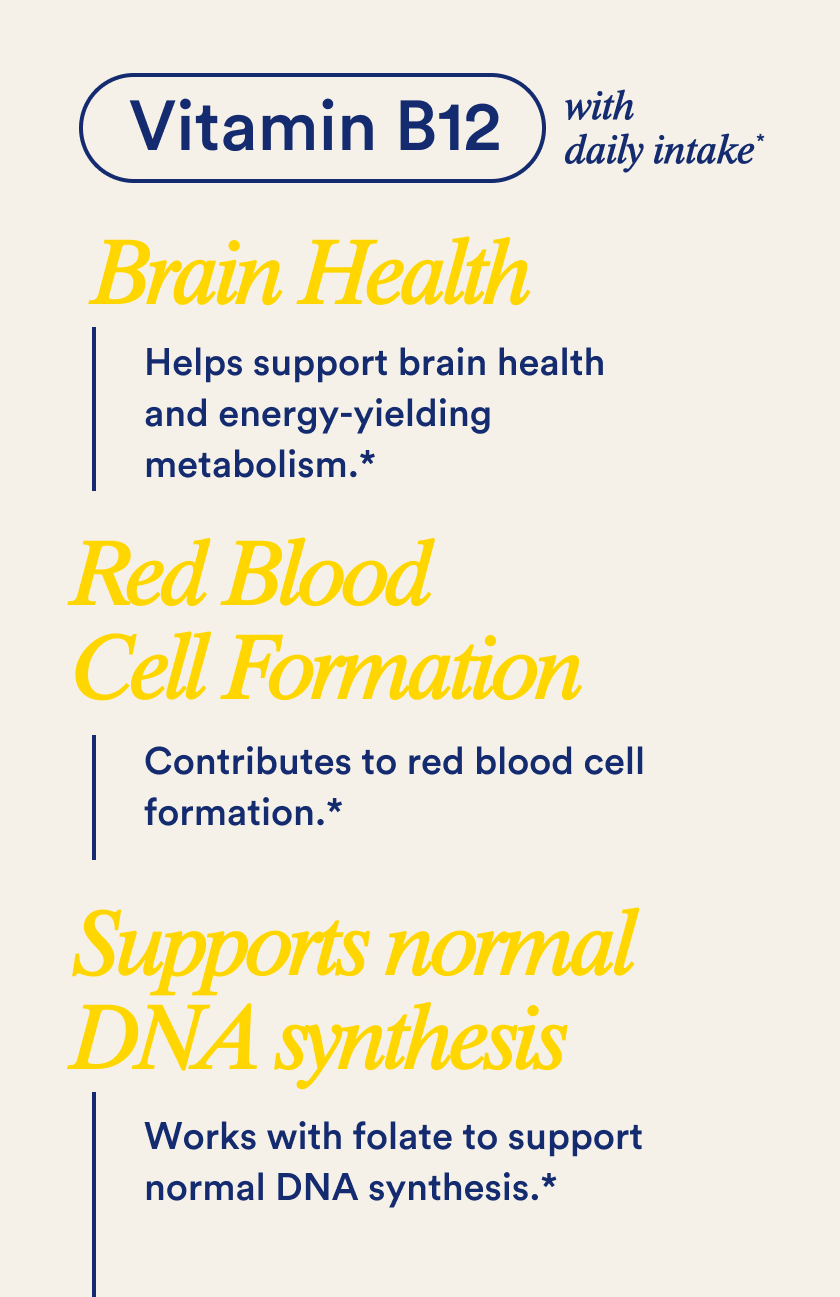Essential Takeaways
- Vitamin B12 plays many roles in the body: It helps support brain health and energy-yielding metabolism, contributes to red blood cell formation, and works with folate to support normal DNA synthesis, to name just a few.*
- Find out how much some experts recommend taking per day below.*
The B vitamins are a group of eight vitamins, sometimes referred to as the B complex vitamins. Since they can be… well, complex, they’re often misunderstood.
They’re indicated by an array of numbers and associated names—vitamin B1 (thiamin), B2 (riboflavin), B3 (niacin), B5 (pantothenic acid), B6, B7 (biotin), B9 (folate), and B12—each of which is molecularly different from the other. (6)
But lest you write off the B vitamins as superfluous nutrients mainly found in, say, energy drinks, we’d be remiss not to emphasize that B vitamins are as vital to the body’s function as more commonly-discussed nutrients, such as vitamin D and omega-3 fatty acids. And just like with other nutrients, it’s important to hit the recommended levels, particularly on a consistent basis.*
Let’s take a closer look at this micronutrient, its role, and why it’s something to pay attention to daily.
What does vitamin B12 do?
Vitamin B12 (cobalamin) functions as a cofactor for two enzymes. A cofactor is a word that scientists use to describe molecules whose presence is essential for enzyme activity. Think of cofactors similarly to spark plugs in a car engine; the ignition can’t start without them.
Vitamin B12 plays many roles in the body: It helps support brain health and energy-yielding metabolism; contributes to red blood cell formation; and works with folate to support normal DNA synthesis, to name just a few things. So yeah—pretty important.*

Vitamin B12 requires daily intake.
Vitamin B12 is water-soluble, meaning that it dissolves in water and excess is excreted through the urination process. Since the body can’t store water-soluble vitamins, it's especially salient to consume vitamin B12 regularly, whether through a consistent intake of B12-containing foods or via supplementation. Being mindful of consuming B12 is especially key if you follow a vegan diet (more on that soon).*
You might need more vitamin B12 as you age.
To be clear: It’s not that the body needs more vitamin B12, but that older adults often have a harder time absorbing vitamin B12 from food sources. Because of this, the Institute of Medicine (IOM) recommends that adults over the age of 50 obtain most of their vitamin B12 from vitamin supplements or fortified foods.* (2,6)
If you don’t eat animal foods, it’s important to stay mindful of vitamin B12 intake.
A review published in Frontiers in Nutrition notes that the risk of vitamin B12 shortfalls increases when adopting a vegan diet or any diet that restricts animal products. (Generally speaking, vegans have a tough time regularly getting enough vitamin B12 from their diets.)* (3,5)
Food sources of vitamin B12 are mostly those of animal origin—think fish, meat, poultry, eggs, and dairy products. With the exception of nutritional yeast, nori, and some fortified cereals, vegan sources of vitamin B12 tend to be exceptionally sparse. However, ovo-lacto vegetarians—aka vegetarians who consume dairy and eggs—can still find vitamin B12 in the “ovo-lacto” part of their meal (i.e. eggs and dairy), but supplementing with a multivitamin that contains B12 may be helpful for all who follow a plant-based diet.* (5)
Why is vitamin B12 called cobalamin?
Great question. Vitamin B12 owes its name to the fact that it contains the mineral cobalt, symbolized as Co in the periodic table of elements (high school chemistry class, anyone?). Cobalamins actually refer to several cobalt-containing compounds, meaning that multiple compounds have vitamin B12 activity including:
- Methylcobalamin
- Adenosylcobalamin
- Cyanocobalamin
- Hydroxocobalamin
The supplement form is (really) important.
In the supplement aisle, vitamin B12 is commonly found in the form of cyanocobalamin. The catch? Chemically, cyanocobalamin isn't the most metabolically active form of vitamin B12 since it must be converted into methylcobalamin, or 5-deoxyadenosylcobalamin. With that in mind, why not go straight to the source?* (5)
That’s why we use methylcobalamin—also known as methylated B12—in our multivitamins. We chose it because it’s an active form of vitamin B12 that can be found naturally in food. (FWIW, cyanocobalamin commonly exists in supplement form.)* (5)
Essential reading → Meet AnMar International, our Vitamin B12 Producer
So, how much vitamin B12 is recommended daily?
For adults, the Recommended Dietary Allowance (RDA) for vitamin B12 is 2.4 mcg per day (micrograms). For those who are pregnant or breastfeeding, the RDA is slightly higher, at 2.6 mcg and 2.8 mcg per day, respectively.* (5)
An easy way to meet B12 requirements
Vitamin B12 may not be at the top of your mind as you navigate daily life. One easy way to take the guesswork out of trying to support vitamin B12 intake is to invest in a daily multivitamin that contains vitamin B12.*
Of course, if you have questions about nutrient supplementation (including concerns about vitamin B12 shortfalls), we always recommend speaking with a trusted healthcare provider.*
References:
- Allen, L. How common is vitamin B-12? Retrieved from the American Journal of Clinical Nutrition.
- Wong, C. Vitamin B12 in the elderly: is it worth screening? Retrieved from the Hong Kong Medical Journal.
- Obeid, R., et. al. Vitamin B12 intake from animal foods, biomarkers, and health aspects. Retrieved from Frontiers in Nutrition.
- National Institutes of Health. (2021, April 6). Vitamin B12 - Health Professional Fact Sheet. NIH Office of Dietary Supplements.
- Institute of Medicine. Food and Nutrition Board. Dietary Reference Intakes: Thiamin, Riboflavin, Niacin, Vitamin B6, Folate, Vitamin B12, Pantothenic Acid, Biotin, and Choline. Washington, DC: National Academy Press, 1998.












